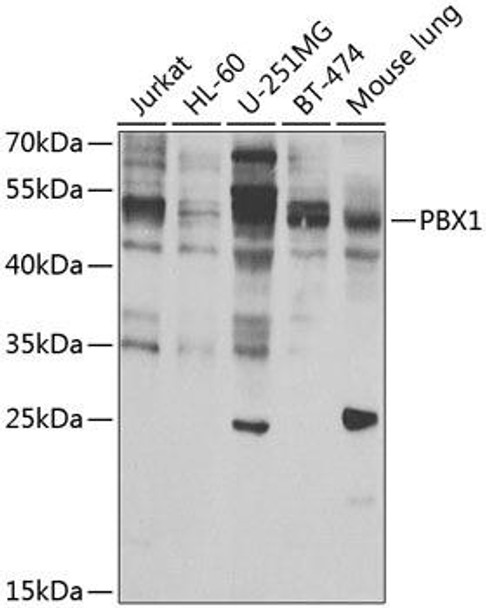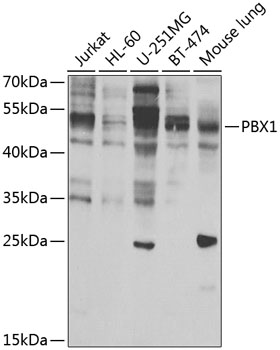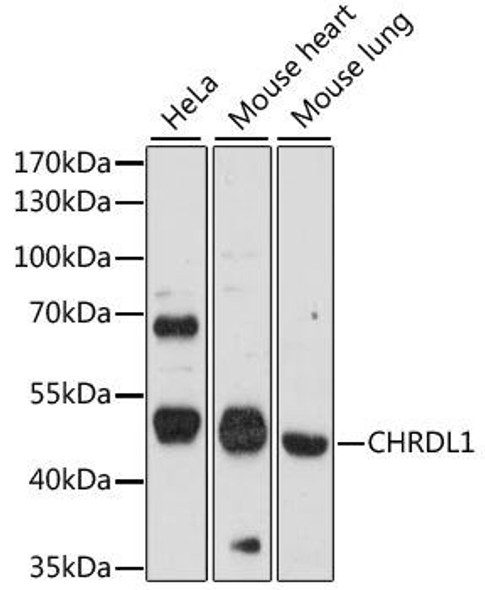Anti-PBX1 Antibody (CAB7567)
- SKU:
- CAB7567
- Product type:
- Antibody
- Reactivity:
- Human
- Mouse
- Host Species:
- Rabbit
- Isotype:
- IgG
- Antibody Type:
- Polyclonal Antibody
- Research Area:
- Developmental Biology
Description
| Antibody Name: | Anti-PBX1 Antibody |
| Antibody SKU: | CAB7567 |
| Antibody Size: | 20uL, 50uL, 100uL |
| Application: | WB |
| Reactivity: | Human, Mouse |
| Host Species: | Rabbit |
| Immunogen: | Recombinant fusion protein containing a sequence corresponding to amino acids 311-430 of human PBX1 (NP_002576.1). |
| Application: | WB |
| Recommended Dilution: | WB 1:500 - 1:2000 |
| Reactivity: | Human, Mouse |
| Positive Samples: | Jurkat, HL-60, U-251MG, BT-474, Mouse lung |
| Immunogen: | Recombinant fusion protein containing a sequence corresponding to amino acids 311-430 of human PBX1 (NP_002576.1). |
| Purification Method: | Affinity purification |
| Storage Buffer: | Store at -20°C. Avoid freeze / thaw cycles. Buffer: PBS with 0.02% sodium azide, 50% glycerol, pH7.3. |
| Isotype: | IgG |
| Sequence: | VTAT NVSA HGSQ ANSP STPN SAGS SSSF NMSN SGDL FMSV QSLN GDSY QGAQ VGAN VQSQ VDTL RHVI SQTG GYSD GLAA SQMY SPQG ISAN GGWQ DATT PSSV TSPT EGPG SVHS DTSN |
| Gene ID: | 5087 |
| Uniprot: | P40424 |
| Cellular Location: | Nucleus |
| Calculated MW: | 38kDa/46kDa |
| Observed MW: | 47kDa |
| Synonyms: | PBX1 |
| Background: | This gene encodes a nuclear protein that belongs to the PBX homeobox family of transcriptional factors. Studies in mice suggest that this gene may be involved in the regulation of osteogenesis and required for skeletal patterning and programming. A chromosomal translocation, t(1;19) involving this gene and TCF3/E2A gene, is associated with pre-B-cell acute lymphoblastic leukemia. The resulting fusion protein, in which the DNA binding domain of E2A is replaced by the DNA binding domain of this protein, transforms cells by constitutively activating transcription of genes regulated by the PBX protein family. Alternatively spliced transcript variants encoding different isoforms have been found for this gene. |
| UniProt Protein Function: | PBX1: Binds the sequence 5'-ATCAATCAA-3'. Acts as a transcriptional activator of PF4 in complex with MEIS1. Converted into a potent transcriptional activator by the (1;19) translocation. May have a role in steroidogenesis and, subsequently, sexual development and differentiation. Forms a heterodimer with MEIS1 which binds DNA including a cAMP-responsive sequence in CYP17. Also forms heterotrimers with MEIS1 and a number of HOX proteins including HOXA9, HOXD4, HOXD9 and HOXD10. Interacts with PBXIP1. Expressed in all tissues except in cells of the B and T lineage. Belongs to the TALE/PBX homeobox family. 2 isoforms of the human protein are produced by alternative splicing. |
| UniProt Protein Details: | Protein type:Transcription factor; DNA-binding; Oncoprotein; Motility/polarity/chemotaxis Chromosomal Location of Human Ortholog: 1q23 Cellular Component: nucleoplasm; transcription factor complex; cytoplasm; nucleus Molecular Function:protein binding; DNA binding; protein heterodimerization activity; transcription factor binding; transcription factor activity Biological Process: spleen development; transcription, DNA-dependent; thymus development; embryonic hemopoiesis; somatic stem cell maintenance; adrenal gland development; negative regulation of transcription factor activity; embryonic skeletal development; anterior/posterior pattern formation; negative regulation of neuron differentiation; ureteric bud branching; positive regulation of cell proliferation; positive regulation of transcription from RNA polymerase II promoter; regulation of ossification; steroid biosynthetic process; sex differentiation; proximal/distal pattern formation; embryonic limb morphogenesis |
| NCBI Summary: | This gene encodes a nuclear protein that belongs to the PBX homeobox family of transcriptional factors. Studies in mice suggest that this gene may be involved in the regulation of osteogenesis and required for skeletal patterning and programming. A chromosomal translocation, t(1;19) involving this gene and TCF3/E2A gene, is associated with pre-B-cell acute lymphoblastic leukemia. The resulting fusion protein, in which the DNA binding domain of E2A is replaced by the DNA binding domain of this protein, transforms cells by constitutively activating transcription of genes regulated by the PBX protein family. Alternatively spliced transcript variants encoding different isoforms have been found for this gene. [provided by RefSeq, Jun 2017] |
| UniProt Code: | P40424 |
| NCBI GenInfo Identifier: | 730279 |
| NCBI Gene ID: | 5087 |
| NCBI Accession: | P40424.1 |
| UniProt Related Accession: | P40424 |
| Molecular Weight: | 38kDa; 46kDa |
| NCBI Full Name: | Pre-B-cell leukemia transcription factor 1 |
| NCBI Synonym Full Names: | PBX homeobox 1 |
| NCBI Official Symbol: | PBX1 |
| NCBI Official Synonym Symbols: | CAKUHED |
| NCBI Protein Information: | pre-B-cell leukemia transcription factor 1 |
| UniProt Protein Name: | Pre-B-cell leukemia transcription factor 1 |
| UniProt Synonym Protein Names: | Homeobox protein PBX1; Homeobox protein PRL |
| Protein Family: | Pre-B-cell leukemia transcription factor |
| UniProt Gene Name: | PBX1 |
| UniProt Entry Name: | PBX1_HUMAN |








